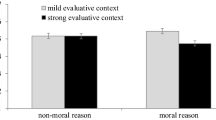Abstract
A centuries-old philosophical issue—Do honorable intentions make an action praiseworthy or is the best action one that generates the greatest good for the greatest number?—was examined by telling subjects who were working to earn money for themselves or a charity that they succeeded or failed at the task. Confirming predictions derived from personal moral philosophy theory, idealistic individuals who stress the importance of fundamental moral principles (absolutists) felt the most positive about their own morality when they were working for a charity, irrespective of the consequences of their actions. Principled individuals who were not idealistic (exceptionists), however, reported feeling distressed when laboring for a charity rather than themselves and the most morally virtuous when they performed badly when working for personal gain. Relativistic subjects (situationists and subjectivists) did not rate themselves as positively when working for a charity. These findings indicate that, at the psychological level, individuals consider both intentions and consequences when evaluating their own moral successes and failures, but they differ in the weight that they assign to these two factors.
Similar content being viewed by others
References
Boyce, W. D., & Jensen, L.C. (1978).Moral reasoning: A psychological-philosophical integration. Lincoln: U. of Nebraska Press.
Darley, J. M., & Shultz, T. R. (1990). Moral rules: Their content and acquisition.Annual Review of Psychology, 41, 525–556.
Dienstbier, R. A., Hillman, D., Lehnhoff, J., Hillman, J., & Valkenaar, M. C. (1975). An emotion-attribution approach to moral behavior: Interfacing cognitive and avoidance theories of moral development.Psychology Review, 82, 299–315.
Einhorn, J. (1983). An unequivocal “yes” for morality study.American Psychologist, 38, 1255–1256.
Forsyth, D. R. (1980). A taxonomy of ethical ideologies.Journal of Personality and Social Psychology, 39, 175–184.
Forsyth, D. R. (1981). Moral judgment: The influence of ethical ideology.Personality and Social Psychology Bulletin, 7, 218–223.
Forsyth, D. R. (1985). Individual differences in information integration during moral judgment.Journal of Personality and Social Psychology, 49, 264–272.
Forsyth, D. R., & Berger, R. E. (1982). The effects of ethical ideology on moral behavior.Journal of Social Psychology, 117, 53–56.
Forsyth, D. R., & Nye, J. L. (1990). Personal moral philosophies and moral choice.Journal of Research in Personality, 24, 398–414.
Forsyth, D. R., Nye, J. L., & Kelley, K. (1988). Idealism, relativism, and the ethic of caring.Journal of Psychology, 122, 243–248.
Forsyth, D. R., & Pope, W. R. (1984). Ethical ideology and judgments of social psychological research.Journal of Personality and Social Psychology, 46, 1365–1375.
Forsyth, D. R., Pope, W. R., & McMillan, J. H. (1985). Students’ reactions after cheating.Contemporary Educational Psychology, 10, 72–82.
Forsyth, D. R., & Schlenker, B. R. (1977). Attributing the causes of group performance: Effects of performance quality, task importance, and future testing.Journal of Personality, 45, 220–236.
Gilligan, C. (1982).In a different voice. Cambridge, MA: Harvard University Press.
Haan, N. (1982). Can research on morality be “scientific?”American Psychologist, 37, 1096–1104.
Hogan, R. (1973). Moral conduct and moral character: A psychological perspective.Psychological Bulletin, 79, 217–232.
James, W. (1891/1973). The moral philosopher and the moral life. In P. E. Davis (Ed.),Introduction to moral philosophy (pp. 145–158). Columbus, OH: Merrill.
Kant, I. (1873/1973). Critique of pure reason and other works on the theory of ethics. T. K. Abbott (trans). In P. E. Davis (Ed.),Introduction to moral philosophy (pp. 62–94). Columbus, OH: Merrill.
Kohlberg, L. (1983).Essays in moral development (Vol. 2). New York: Harper & Row.
Kurtines, W. M. (1986). Moral behavior as rule governed behavior: Person and situation effects on moral decision making.Journal of Personality and Social Psychology, 50, 784–791.
Kurtines, W. M., Alvarez, M., & Azmitia, M. (1990). Science and morality: The role of values in science and the scientific study of moral phenomena.Psychological Bulletin, 107, 283–295.
Leary, M. R., Knight, P. D., & Barnes, B. D. (1986). Ethical ideologies of the Machiavellian.Personality and Social Psychology Bulletin, 12, 75–80.
Piaget, J. (1932/1960).The moral judgment of the child. London: Kegan Paul.
Rosenberg, M. (1965).Society and the adolescent self-image. Princeton, N.J.: Princeton University Press.
Schlenker, B. R., & Forsyth, D. R. (1977). On the ethics of psychological research.Journal of Experimental Social Psychology, 13, 369–396.
Singh, B., & Forsyth, D. R. (1989). Sexual attitudes and moral values: The importance of idealism and relativism.Bulletin of the Psychonomic Society, 27, 160–162.
Snook, S. C., & Gorsuch, R. L. (1989). Component analysis versus common factor analysis: A Monte Carlo study.Psychological Bulletin, 106, 148–153.
Waterman, A. S. (1988). On the uses of psychological theory and research in the process of ethical inquiry.Psychology Bulletin, 103, 283–298.
Author information
Authors and Affiliations
Additional information
This research was supported by the Grants-In-Aid Program for Faculty of Virginia Commonwealth University.
Rights and permissions
About this article
Cite this article
Forsyth, D.R. Honorable intentions versus praiseworthy accomplishments: The impact of motives and outcomes on the moral self. Current Psychology 12, 296–311 (1993). https://doi.org/10.1007/BF02686811
Accepted:
Issue Date:
DOI: https://doi.org/10.1007/BF02686811




